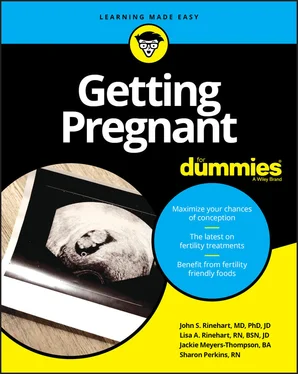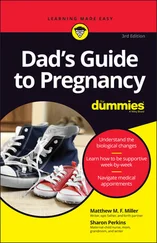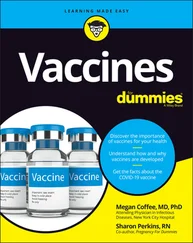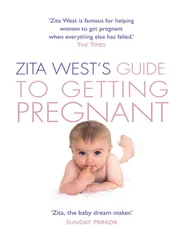Smokers’ eggs have more genetic abnormalities.
Smokers’ eggs are prone to polyspermy, where two or more sperm enter an egg. The embryos that result are chromosomally abnormal and will not grow.
If you’ve quit but your partner hasn’t, he may want to consider the following:
Men who smoke have a lower sperm count.
Men who smoke have a 20 percent decrease in sperm motility.
Smokers’ sperm have more abnormal shapes. Abnormally shaped sperm have a higher rate of chromosomal abnormalities.
Secondhand smoke exposure during pregnancy increases miscarriage rates by 11 percent.
 Many studies have demonstrated that smokers have lower success rates for the treatments for infertility. Bottom line: stop smoking!
Many studies have demonstrated that smokers have lower success rates for the treatments for infertility. Bottom line: stop smoking!
A recently published article (Lyhgso, et al. Human Reproduction [2019] 34:1334) addressed the issue of mild to moderate alcohol consumption and infertility. The study asked the question: “Does female weekly alcohol intake and binge drinking impact the chance of a successful infertility treatment?” The study gathered information about the alcohol consumption of 1,708 women and their partners undergoing fertility treatment. The outcome was the achievement of a clinical pregnancy and live birth. The study found “low to moderate average weekly alcohol intake was not statistically significantly associated with the chance of achieving a clinical pregnancy or a live birth.” The study divided that amount of alcohol consumed per week into none, 1–2 (alcoholic drinks), 3–7, and > 7 drinks. The chance for conception and live birth using either IUI or IVF was the same for all groups. The conclusion from the authors was that the results of their study suggest that it is not necessary to abstain from drinking alcohol when undergoing fertility treatments.
Putting this into perspective, once pregnant, there is ample evidence that heavy alcohol consumption can harm the developing pregnancy. So, the advice to abstain from heavy alcohol consumption while pregnant is appropriate. The American College of Obstetricians and Gynecologists (ACOG) guidelines state that all alcohol types are harmful to an established pregnancy even potentially in the early weeks of pregnancy.
 While all of the preceding information is fascinating, how does it help people trying to conceive? The most important lesson is that total abstinence while in treatment for infertility is unnecessary. There is no harm in having an occasional drink while undergoing infertility treatments. However, once there is a possibility of being pregnant, alcohol consumption should be avoided.
While all of the preceding information is fascinating, how does it help people trying to conceive? The most important lesson is that total abstinence while in treatment for infertility is unnecessary. There is no harm in having an occasional drink while undergoing infertility treatments. However, once there is a possibility of being pregnant, alcohol consumption should be avoided.
What about coffee? Who doesn’t need that morning joe to start the day? Americans drink an average of 2.1 cups of coffee per day. But does that morning cup of coffee decrease the chance for achieving a pregnancy if a person is in treatment for infertility? Remember the alcohol study we talked about in the last section? In a different published study, the same researchers also evaluated the impact of coffee upon the success of infertility treatments. They found that for women undergoing IVF, coffee consumption did not affect the chance of achieving a clinical pregnancy or live birth. Good news! Women using IUI and consuming 1–5 cups of coffee a day had an increased chance of achieving a clinical pregnancy and live birth. So, if you’re suffering a severe morning headache and lethargy, go back to your coffee.
Undoubtedly you know that illegal drugs are taboo when trying to become pregnant! Here are the problems that some common drugs can cause when you’re trying to get pregnant.
Cocaine use during pregnancy occurs in over 750,000 pregnancies per year. Cocaine causes constriction of the blood vessels, which can result in early miscarriage, preterm delivery, and problems with the placenta, the organ that nourishes the baby. In addition, cocaine can cause menstrual irregularities, possibly making it harder for you to become pregnant.
One of the trending topics of late has been cannabis use and its effects. Marijuana is the most commonly used recreational drug in the United States with an estimated 22 million using the drug in the preceding month and over 117 million lifetime users. Cannabis has been around a long time, but recent changes in legislation and societal attitudes have led to a rise in the use of cannabis. Almost every evil imaginable has at one time or another been linked to the use of cannabis. However, now that so many people are using cannabis — and many legally — efforts are underway to accurately determine the dangers and benefits of cannabis use, including those involving male fertility.
Marijuana lowers sperm count; decreases sperm’s motility or sperm’s ability to move forward; and lowers the amount of testosterone in males. The problem is that semen study results don’t always correlate with pregnancy rates. So while the numbers in the results of a a semen analysis may be worse after marijuana use, the actual chance of conceiving may not be changed. But, does marijuana decrease the chance for males to father a child? The truth is that we just don’t know. There is no credible, large study that addresses this issue. That is truly disappointing.
What about women and marijuana? There is some evidence that some women who use marijuana when they are pregnant may have an increase in growth restriction of the fetus and preterm labor. However, there is very little evidence to date about how marijuana affects the ability to conceive. A recent study looked at the use of marijuana and the time it took to conceive for both men and women. The study reported that there was no change in the time it took to conceive based either upon use of marijuana or frequency of use of marijuana.
 So, what is a couple to do? Much like alcohol and cigarette smoking, cannabis may decrease a couple’s chance of conceiving. So, until better evidence is obtained, prudence would say to use these substances in moderation, if at all. This would be particularly true for a male, given the reduction in the semen characteristics.
So, what is a couple to do? Much like alcohol and cigarette smoking, cannabis may decrease a couple’s chance of conceiving. So, until better evidence is obtained, prudence would say to use these substances in moderation, if at all. This would be particularly true for a male, given the reduction in the semen characteristics.
 Some studies show that as many as 6 to 7 percent of all males have used anabolic steroids before age 18 to build muscle mass. Anabolic steroids are really variations on testosterone. Taking these steroids is like a woman taking a birth control pill. In males, anabolic steroids tell the brain the testis is overworking and thus the brain reduces the release of FSH and LH, both of which are needed for normal sperm production. Extensive and extended use of anabolic steroids can result in permanent loss of sperm production and cause a man to become sterile. Many men will have return of sperm production, but it may take months. So anabolic steroids need to be avoided when a man is trying to father a child.
Some studies show that as many as 6 to 7 percent of all males have used anabolic steroids before age 18 to build muscle mass. Anabolic steroids are really variations on testosterone. Taking these steroids is like a woman taking a birth control pill. In males, anabolic steroids tell the brain the testis is overworking and thus the brain reduces the release of FSH and LH, both of which are needed for normal sperm production. Extensive and extended use of anabolic steroids can result in permanent loss of sperm production and cause a man to become sterile. Many men will have return of sperm production, but it may take months. So anabolic steroids need to be avoided when a man is trying to father a child.
Understanding Common Infections That Can Cause Uncommon Results
The onset of the sexual revolution in the 1960s caused a lot of fallout, and some of it fell on future fertility. Sexually transmitted infections , or STIs, (formerly called STDs or sexually transmitted diseases) have increased dramatically in the last 20 years. More than 13 million Americans each year are affected, and many STDs pack a major anti-fertility wallop for both sexes. The 2017 CDC data on STIs reported that three STIs had a record all-time high. The report stated that gonorrhea rose by 67 percent, syphilis by 76 percent, and chlamydia by 21 percent from the previous year. In 2018, the World Health Organization (WHO) reported an estimated 376 million new cases of STIs each year (namely, chlamydia, gonorrhea, syphilis, or trichomoniasis). One researcher speculated that while people were having less sex, they engaged in riskier sexual habits such as condom-less sex and opioid addicted–related sex.
Читать дальше

 Many studies have demonstrated that smokers have lower success rates for the treatments for infertility. Bottom line: stop smoking!
Many studies have demonstrated that smokers have lower success rates for the treatments for infertility. Bottom line: stop smoking! While all of the preceding information is fascinating, how does it help people trying to conceive? The most important lesson is that total abstinence while in treatment for infertility is unnecessary. There is no harm in having an occasional drink while undergoing infertility treatments. However, once there is a possibility of being pregnant, alcohol consumption should be avoided.
While all of the preceding information is fascinating, how does it help people trying to conceive? The most important lesson is that total abstinence while in treatment for infertility is unnecessary. There is no harm in having an occasional drink while undergoing infertility treatments. However, once there is a possibility of being pregnant, alcohol consumption should be avoided.










